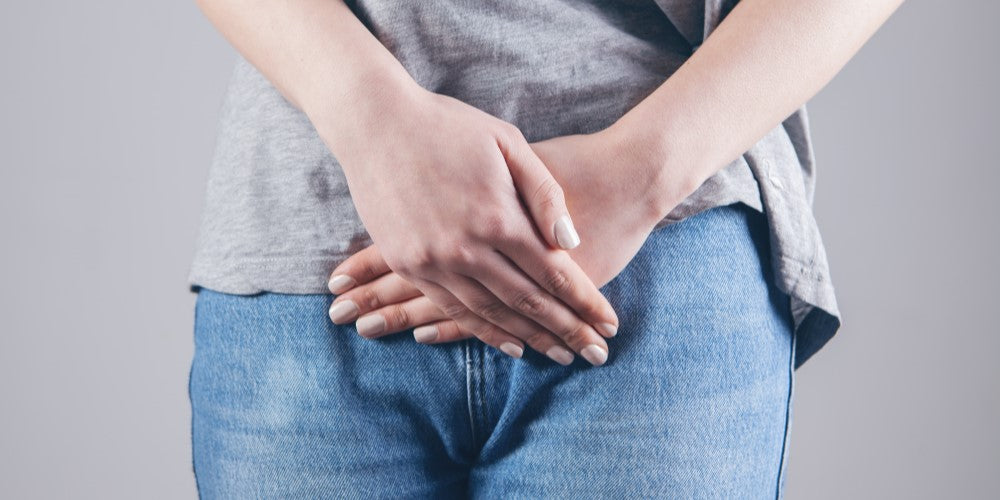Bloating can be uncomfortable and sometimes even painful. If you’ve ever experienced a feeling of tightness in your stomach, or noticed that your belly seemed fuller than usual, you’ve most likely experienced occasional bloating.
Most people experience occasional bloating from time to time, and it is not abnormal nor uncommon.*
Wondering what might be causing your occasional bloating, or how to relieve it?
Keep reading to find out more!
What is Bloating?
Something as simple as the food you eat can cause air or gas to build up in your gastrointestinal (GI) tract. When you’re stomach feels a bit fuller or tighter than usual, this is typically a sign of a bloated belly.*
Bloating is also sometimes referred to as abdominal distension. It can be quite uncomfortable, and sometimes even painful. The air build-up around your abdomen will often make it stick outward.*

What Might cause Abdominal Distension?
Bloating has causes that aren’t always due to underlying diseases or related health conditions. Dietary factors like a low intake of probiotics, an inability to properly break down sugars and carbohydrates, inadequate protein digestion, or someone’s general ability to digest, metabolize, and excrete the waste of certain foods can all lead to a bloated gut.*
Common Foods that May Cause Bloating
- Foods containing gluten and/or refined grain products.
- Foods high in FODMAPs, a specific type of carbohydrate.
- Sugar and Sweetened Snacks.
- Carbonated Drinks.
- Chewing Gum.
- Dairy Products and/or Desserts.
- Certain types of Fermentable Fruit (in some cases).
- Artificial sweeteners and/or Sugar Alcohols.
Some individuals may experience food sensitivities to gluten, shellfish, dairy, nuts, eggs, or other foods, and these allergies and/or sensitivities can potentially lead to bloating. Food intolerances or an overall gut microbe imbalance are potential culprits, as well.*
Other Factors to Consider
- Overall Gut Health.
- Gut Transit Time (occasional constipation).
- Your Diet.
- High Levels of Stress and/or Anxiety.
- Alcohol Consumption.
- Thyroid or Hormonal Function.
- Dehydration.
- Excess Intestinal Gas.
- Any Health Conditions or Concerns.
We recommend always consulting with your doctor about any questions or concerns you might have about your gut health or if you experience frequent bloating.

What else Might Help Beat the Bloat?
Sometimes beating the bloat is just a matter of tweaking your diet to work around your food sensitivities and/or dietary needs, or focusing on implementing more probiotics and/or enzymes into your daily regimen to boost your gut microbiome. It’s always important to know your health needs before you make any decisions about your gut health. That’s why we strongly suggest talking with your doctor to see what will best benefit you in the long run.*
Tips & Tricks
- Up your probiotic intake.
- Eat more fruits and vegetables.
- Consume herbs and spices.
- Slow down when you eat your meals. Portion your food.
- Make sure you are getting enough daily exercise.
- Sit up straight after you consume food.
- Make water your number one go-to drink.
- Get more sleep every night.
- Go on a leisurely stroll after eating a meal.
- Switch those sugary snacks with healthy alternatives.

Supplements that May Help with Occasional Bloating
Some studies suggest that probiotics can help with digestive symptoms like inflammation, tension, and excess gas.*
This probiotic contains 51 billion colony forming units from 11 different probiotic strains. The blend is carefully formulated to work in harmony with your body to not only support your immune system but your gut health, too.
Some studies suggest that garlic can be super beneficial in beating the bloat because it may stimulate digestion and help the body break down food much easier.*
These pure organic bulb garlic capsules are beneficial in boosting your overall wellbeing, including heart and immune system health, as well as assisting with cellular detoxification. They’re odorless and tasteless, and promote healthy digestion.
Studies have shown that turmeric can be a powerful anti-inflammatory, and that curcumin may help to combat indigestion, bloating, and gas.*
This 1300mg formula is made with 95% Standardized Curcuminoids and Boswellia Serrata for joint support, overall body wellbeing, and cognitive health. Along with these benefits, this supplement also promotes healthy inflammatory responses in your body, and is blended with Bioperine® for enhanced bioavailability and maximum absorption.
Was this blog helpful? What do you think about occasional bloating and the tips we suggested? Let us know! We’d love to hear from you.
Interested in trying probiotics to improve your gut health? Click here to get started.
References:
“12 Proven Ways to Reduce or Stop Bloating.” Healthline, 7 Dec. 2021, www.healthline.com/nutrition/proven-ways-to-reduce-bloating#:~:text=Some%20studies%20suggest%20that%20probiotics.
“Best Natural Ways to Reduce Belly Bloat Recipes, News, Tips and How-Tos.” Food Network Canada, 12 June 2017, www.foodnetwork.ca/article/10-natural-ways-to-reduce-belly-bloat/.
Walsh, Grace. “How to Reduce Bloating: Natural Remedies for Bloating.” GoodtoKnow, 28 May 2020, www.goodto.com/wellbeing/how-to-reduce-bloating-288136.





Comments (0)